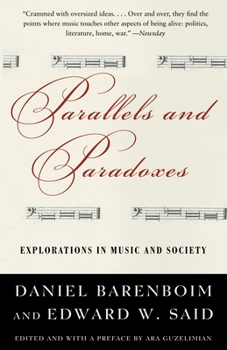Parallels and Paradoxes: Explorations in Music and Society
Select Format
Select Condition 
Book Overview
These free-wheeling, often exhilarating dialogues are an exchange between two prominent figures in contemporary culture: Daniel Barenboim, internationally renowned conductor and pianist, and Edward W. Said, eminent literary critic and impassioned commentator on the Middle East. Barenboim is an Argentinian-Israeli and Said a Palestinian-American; they are also close friends. " A] genuine give-and-take between keen minds and open hearts. . . . The fluidity of their relationship, like musicians in an orchestra, is a compelling model for a world often splintered by dogma, ideology and hermetically sealed minds." -Los Angeles Times As they range across music, literature, and society, they open up many fields of inquiry: the importance of a sense of place; music as a defiance of silence; the legacies of artists from Mozart and Beethoven to Dickens and Adorno; Wagner's anti-Semitism; and the need for "artistic solutions" to the predicament of the Middle East--something they both witnessed when they brought young Arab and Israeli musicians together. Erudite, intimate, thoughtful and spontaneous, Parallels and Paradoxes is a virtuosic collaboration.
Format:Paperback
Language:English
ISBN:1400075157
ISBN13:9781400075157
Release Date:March 2004
Publisher:Vintage
Length:208 Pages
Weight:0.52 lbs.
Dimensions:0.6" x 5.2" x 7.9"
Customer Reviews
2 ratings
The meaning and value of music
Published by Thriftbooks.com User , 22 years ago
I was very excited to read a book written by one of my favorite 20th century intellectuals and one of my favorite pianists. This is not a musicology text; it is perhaps, something more valuable than that. Edward Said, who died recently, was a pianist himself; this fact combined with his explorations into the meaning of democracy and social culture made reading this book a very interesting proposition alone. The book did not disappoint and offered many surprises both in terms of exploring what classical music can offer to contemporary culture and what music - especially Beethoven's music - means in political terms. The book is organized as a series of conversations in which Baremboim and Said discuss topics that include the apparent detachment that classical music has today from the rest of culture as opposed to the time when an understanding and admiration for it was deemed indispensable for the educated and higher classes. However, what makes the book a pleasure to read is one one level Said and Baremboim clealry love music passionatley, on the other Baremboim is an Israeli citizen, who was the first to perform in the occupied Territories with a palestinian orchestra and also sponsored a Palestinian orchestra to play inn Germany. Edward Said was an intellaetcual that argued passionatley for the Palestinian cause. Their firendship and coomon interest in music offers an undeniable sense of hope for those of us, like myself, who are troubled by the ongiong Arab-Israeli conflict that appears to worsen ebery day. That this hope should be nunaced and coloured with the music of Beethoven seems to be not only fascinating and beautiful, but a tribute to a composer who saw and used music to shake the world and argue for freedom. In so doing baremboim and Said discuss the possibility that music can serve as a model or for undertsanding between peoples and global citizenship. They are both idealists in this sense, but their vision makes beautiful sense nonetheless.
A Book So Full
Published by Thriftbooks.com User , 23 years ago
If there is a book that presents valuable and valid lessons in how to resolve differences, be they in attitudes towards the arts, the lack of music in our educational system, the etiology of the Israeli/Palestinian dichotomy, and so much more, then this collection of conversations between Daniel Barenboim and Edward W. Said as edited and synthesized by Ara Guzelimian is it. This powerful but too brief book reaches for the Nobel Peace Prize in its courage, exploration of the state of man and the possibilities for the future, and in its tremendously accessible format that makes the workings of these three great minds available for us all. Each of the extended conversations taped betaween 1995 and 1999 addresses an interesting topic that serves to open vistas that go far beyond the crux of the topic. Hearing Barenboim expound on the fact that no one can exactly interpret a composer's score because the spirit is not on the page but in the making and experiencing the 'sound' that happens in a live performance rather obliterates all critics who descry individual interpretation of the great composers as "not the composer's intention!" Said carries this into the realm of literature, suggesting that contemporary writers are where they are because of the giants of the past and that we, as readers, are influenced in our interpretation of new work dependent upon our exposure and digestion of works by the old masters. Contemporary music by composers such as Carter, Schoenberg, and Birtwistle are discussed in a way that assists our concept of listening and learning in the concert hall. Similar parallels and similar paradoxes in the international political arena are given the same level of inspiring dialog and paths to understanding. This is a fine, fine book and we are indebted to Ara Guzelimian not only for his written and conversational contributions, but for persevering in having this volume published. Read this and gain insight and intelligence on many streams of thought that will help us all save this planet.





